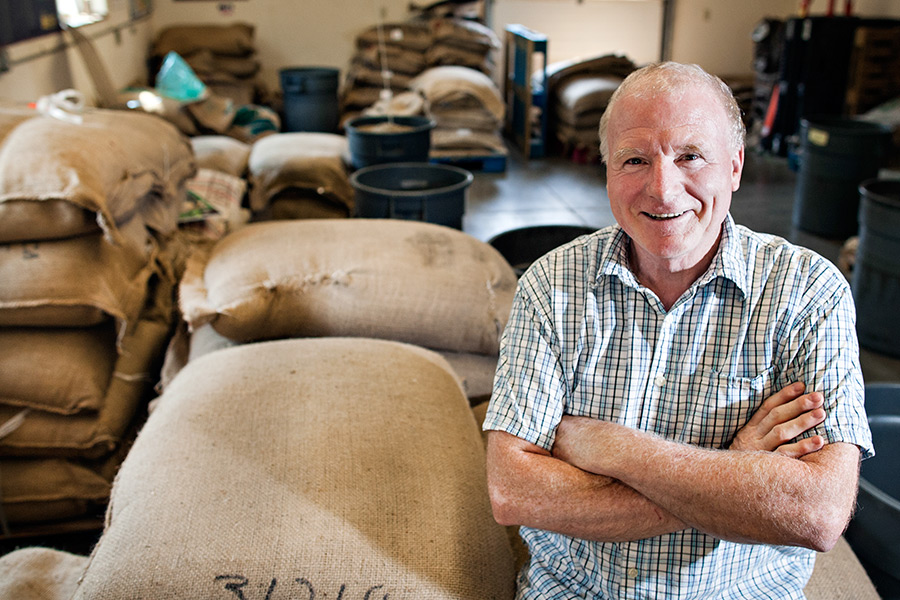WHITEFISH – When R.C. Beall called his friend Scott Brant in the middle of the night in 1980, there was not a single coffee roaster between Spokane and Minneapolis.
“How about we roast some coffee?” Beall asked.
“I know nothing about coffee,” Brant replied.
The next day, Brant went to the library and borrowed “All About Coffee,” a kid’s book.
“Coffee is this exotic and mysterious product, grown all over the world in places I had never heard of,” Brant said. “I was hooked.”
The following year – 1981 – Montana Coffee Traders was born.
“People didn’t know what coffee roasting was about, there wasn’t awareness,” Brant said.
Even though it was a resort town, “Whitefish was different in those days and people struggled to make a living,” but he was confident of success because once you’ve had fresh coffee, “You can never go back.”
In the first months, the roasters would invite passersby to come in and taste a fresh cup of their coffee. Then they would serve canned coffee and let them decide for themselves. Brant also traveled all over the state, inviting coffee shops and stores to try his freshly roasted brews.
“We could roast and ship in one day, and you could be serving the coffee the next day. That was our advantage,” Brant said.
As the company thrived, Brant also helped novice roasters all over the world, including in Moscow right after the fall of communism.
“They hadn’t had good coffee in years,” he said, showing a bright red packet of coffee with “Montana Coffee” posted across the front in Cyrillic, but business in Montana was too busy for him to stay in the Russian market.
Today, Montana Coffee Traders is served in cafes all over the state, including to one of its very first customers, Butterfly Herbs in Missoula. Every week, the roastery off U.S. Highway 93 receives about 80 bags of coffee, each weighing 154 pounds. The coffee beans come from Honduras, Costa Rica, Ethiopia and dozens of other countries.
“Ethiopia is special because it is one of the few coffee-producing countries that drinks coffee. It’s part of their culture and they’re willing to share it with the rest of the world,” Brant said.
In his office, he has a picture of an Ethiopian “cupping,” or coffee tasting. The storage room, roasting room and shop itself are also dotted with pictures Brant has taken on his travels. Many are of the bright red coffee cherries that hide the precious beans; others are of the sifting process; and the majority showcase the bean itself.
“I’m amazed at the amount of work that goes into growing and producing coffee,” Brant said.
This is one of the reasons he and Montana Coffee Traders have always tried to develop healthy relations between roasters and growers.
Coffee growers all over Central and South America describe “los meses flacos,” the thin months when the money from the last harvest has run out and the next harvest is months away.
“Ultimately, if they don’t succeed, they will stop growing, and then where will we be?” Brant asked before explaining his new philanthropic venture, Coffeelands Foundation.
After more than 30 years in the coffee business, Brant isn’t ready to actually retire, even though he stepped down from his role at Montana Coffee Traders on Aug. 15. He’s also not satisfied with the progress that has been made to help the coffee-growing communities. Although Montana Coffee Traders often pays well above the market rate for some of its beans and tries to buy Fair Trade and Organic beans the rest of the time, Brant said it’s not enough.
“What happens when the farmers have a bad season? Even when we pay above the market price, are they getting what they deserve for the amount of work they do?” he asked. He said he doesn’t want to make people feel guilt with every sip of coffee, but rather make them aware and perhaps prepare them to pay more for the drink they love.
Coffeelands Foundation, which is in its first year, has a simple goal. It wants to convince roasters to donate one cent for every pound of coffee they buy. That money will then be distributed to NGOs that work in coffee-growing communities. Coffee prices vary by a couple of cents every day on the commodities market and thus adding an extra cent shouldn’t be a problem, according to Brant.
“I feel like I’m bridging the gap between the roasters and the non-profits,” he said, noting that services not directly related to the growing, such as women’s health care and education, will be crucial to the long-term future of coffee.
“I want coffee to be something we all can be happy about, from the farmer to the roaster all the way to the consumer,” he said.
As the tour of the roastery comes to a close, Brant prepares his guests a cup of Wote Kanga coffee from Ethiopia. It’s a natural pressing coffee, which means that the entire cherry is left out to dry, the seed is never removed and the coffee itself has a rich, wild taste.
“Ethiopia is where coffee originated,” Brant said. “That’s why it always holds such a mystique for me and why I want to help the people that keep it going.”
Scott Brant will be holding a retirement party at the Bohemian Hall, behind Montana Coffee Traders at the Highway 93 location on Friday, Aug. 22, from 3 p.m. to 8 p.m. The public is invited and coffee may be served.
